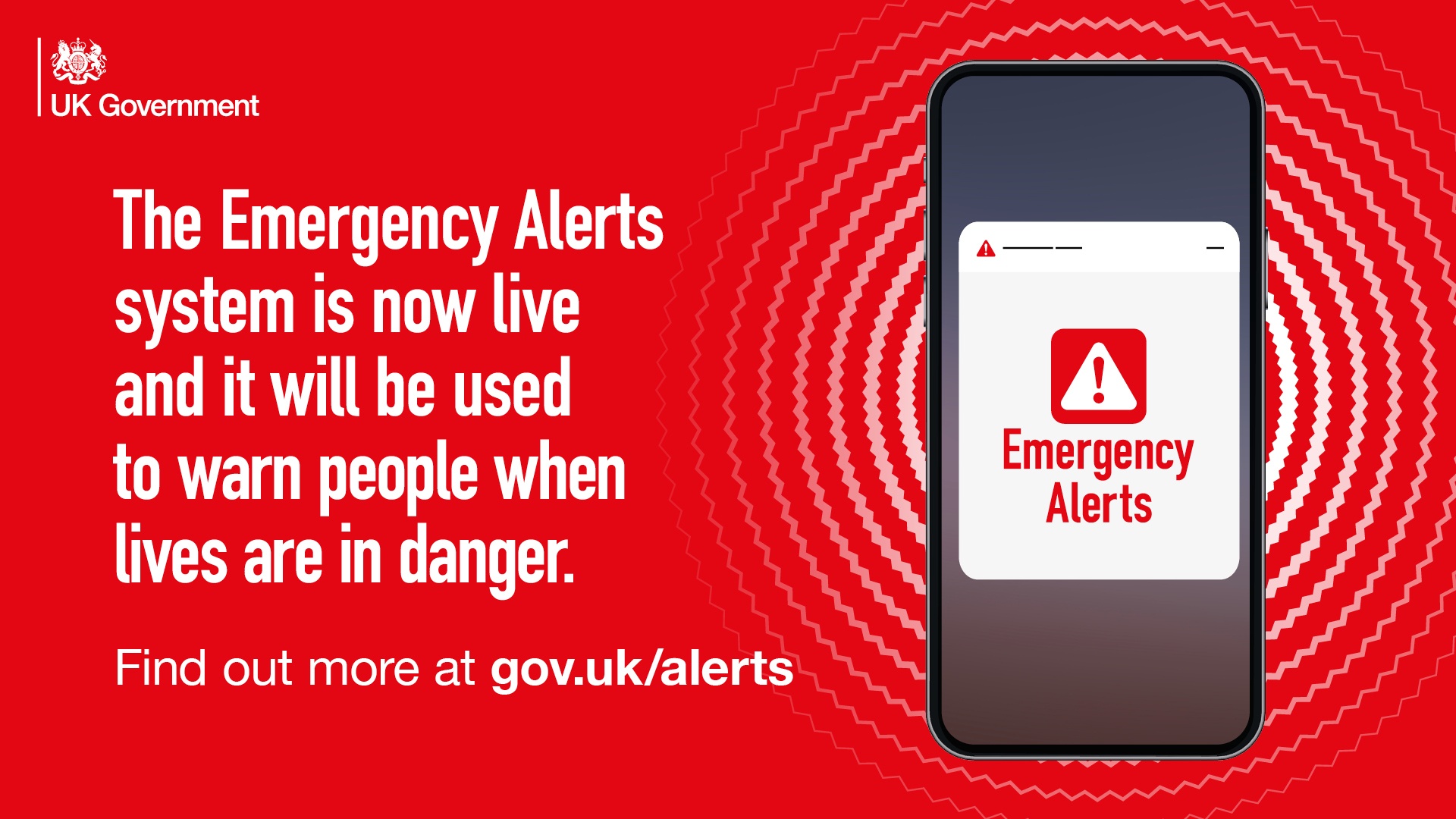Millions of mobile phones across the UK will emit a loud alarm and vibrate at 3pm on April 23 in a nationwide test of a new public alert system.
The system is intended to be used in life-threatening situations including flooding and wildfires.
But domestic violence campaigners have warned the test could put people in danger by revealing the location of secret phones hidden away by those at risk.
The message will be received on 4G and 5G mobile phones, along with sound and vibration for up to ten seconds.
What will happen?
 UK Government
UK GovernmentOn Sunday, at 3pm, a “welcome message” will appear on your device and you will hear a loud siren-like sound.
The siren will stop automatically after ten seconds. The message will stay on screen until you acknowledge it, just like a “low battery” warning.
Phone users will be prompted to acknowledge the alert by swiping or clicking the message before being able to continue using their device.
‘It could be the sound that saves your life‘
 iStock
iStockSunday’s alert is a test, but future emergency alerts will be used to inform people about severe threats to life in particular areas, such as flooding or wildfires.
Chancellor of the Duchy of Lancaster Oliver Dowden said: “Getting this system operational with the national test means we have another tool in our toolkit to keep the public safe in life-threatening emergencies.
“It could be the sound that saves your life.”
The system is modelled on similar schemes in the US, Canada, the Netherlands and Japan.
The test on St George’s Day coincides with major events including the London Marathon and the 2pm kick-off Premier League ties between Bournemouth and West Ham and Newcastle and Tottenham Hotspur.
Officials said they have worked with the Football Association and the Marathon’s organisers to make sure the impact of the test will be limited.
National Fire Chiefs Council chairman Mark Hardingham said: “For ten seconds the national test may be inconvenient for some, but please forgive us for the intrusion because, the next time you hear, it your life, and the life-saving actions of our emergency services, could depend on it.”
Abuse victims urged to turn off phones ahead of emergency alert test
People at risk of domestic abuse have been urged to turn off any devices they want to keep hidden ahead of the launch of the UK’s emergency alert this Sunday.
People who do not wish to receive the alerts will be able to opt out in their device settings, but officials hope the life-saving potential of the messages means that users will keep them on.
The National Centre for Domestic Violence (NCDV) warned people with hidden second mobile phones to turn off the alerts to avoid revealing the location of their devices.
NCDV’s Sharon Bryan said: “Hidden second mobiles are an emergency lifeline for victims and survivors living under the constant threat of abuse, or worse.
“This siren test may unexpectedly reveal their presence to abusers – with disastrous consequences.”
The Government said it has been actively engaging with organisations working with vulnerable women and girls to ensure they are not adversely affected by the introduction of emergency alerts.
Officials stressed that it is easy to opt out of the system if people need their phone to stay concealed, either by turning off the alerts or simply having the phone switched off during the test.
Assistant chief constable Owen Weatherill, from the National Police Chiefs’ Council, said: “Alongside partners, we will continue to listen carefully to public feedback and ensure the use of emergency alerts has a positive impact.”
How can you turn off the emergency alert?
Emergency alerts work on all 4G and 5G phone networks widely used by smartphones. This will not include older “non-smart” phones but the 3G technology that they use is being switched off next year.
You can opt out of the emergency alerts system in your phone’s settings, just search for “emergency alerts”, and turn off “severe alerts” and “extreme alerts”. This varies depending on the make and model of your device.
You will not receive alerts if your device is turned off or in airplane mode. However, these alerts are potentially life-saving so we recommend you keep them switched on.
What happens if you get the alert while driving?
The Government has said if you receive the alert while driving, you should not read or respond to it.
Advice recommends finding somewhere safe and legal to stop before picking up your phone and reading the message. If there is nowhere safe or legal to stop close by, and nobody else is in the vehicle to read the alert, tune into live radio for information until you can find somewhere safe and legal to stop.
Follow STV News on WhatsApp
Scan the QR code on your mobile device for all the latest news from around the country


























